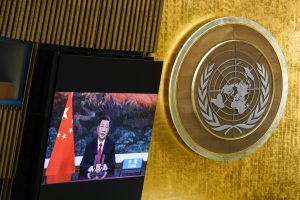There have been several major anniversaries for the People’s Republic of China (PRC) this year, including the 100th anniversary of the establishment of the Chinese Communist Party in July 1921 and the 50th anniversary of U.S. National Security Advisor Henry Kissinger’s breakthrough first visit to Beijing in July 1971. October 29 is another date worth marking: the 50th anniversary of Beijing’s entry into the United Nations.
Until 1971, the China seat had been held by the Nationalist government of the Republic of China residing on Taiwan, a matter that became bound up not only with the legitimacy of Chinese Communist Party rule, but also with the legitimacy of the U.N. itself – an organization committed to universality of membership for those governments in control of territory and people. As U.N. Secretary General Dag Hammarskjold put it in 1955, expressing a view that over time many member states came to share, “I consider it a weakness and an anomaly that this people, one fourth of mankind, is not represented in our work.”
Some 50 years later, the PRC is well-embedded in the U.N. with status as one of the five permanent members (P5) of the Security Council and influence with many states in the U.N. General Assembly. In material terms, Beijing has become the second largest contributor to the U.N.’s overall budget as well as to the U.N.’s peace operations budget and it regularly contributes contingents to U.N. peace operations. It has set up an 8,000-strong peacekeeping stand-by force, as well as a China-U.N. Peace and Development Trust Fund. That Trust Fund, established in 2016, pledged $200 million to the United Nations over a 10-year period. Chinese nationals also currently head three of the U.N.’s specialized agencies, as well as the U.N.’s Department of Economic and Social Affairs (DESA).
The Chinese leadership promises more of the same for the U.N.’s present and future. In Beijing’s official view, it is “firmly committed to safeguarding the U.N.-centered global governance system, the basic norms of international relations underpinned by the purposes and principles of the U.N. Charter, the authority and stature of the U.N., and the central role of the U.N. in international affairs.” This commitment resides alongside a more general determination that China lead the reform of the global governance system, as a number of statements by President Xi Jinping have indicated.
However, closer examination of China’s relationship with the U.N. since its entry in 1971 shows that its attitude toward the body is far more ambivalent than these proclamations imply, and at times contradicts their alleged intent.

































